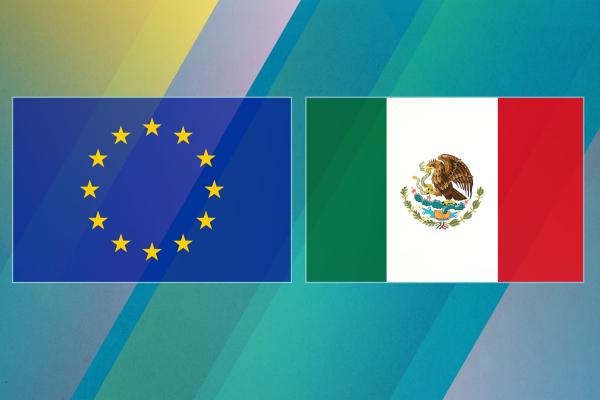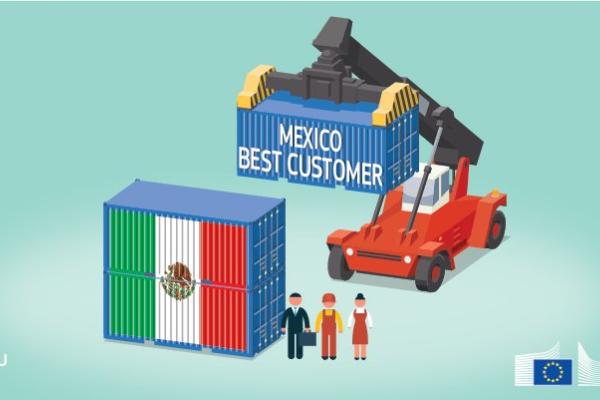- Country or region
- Mexico
- Trade topics
- Negotiations and agreements
- Trade policy
Trade relations between the EU and Mexico are governed by the trade pillar of the EU-Mexico Economic Partnership, Political Coordination and Cooperation Agreement (also referred to as the 'Global Agreement'). Bilateral trade more than quadrupled in the first 20 years of the Global Agreement.
In 2016, the EU and Mexico decided to modernise the EU-Mexico Global Agreement in a comprehensive and ambitious manner. The two sides reached an ‘agreement in principle’ on the trade part in April 2018. The final technical details on public procurement were concluded in April 2020.
On 17 January 2025, the EU announced the conclusion of negotiations on a modernised Global Agreement with Mexico. The modernisation will put in place an ambitious and modern framework to deepen and widen political, cooperation, trade and investment relations between the EU and Mexico. It will create new economic opportunities for both parties, while promoting shared values, including progressive rules on sustainable development.
Subject to final legal revision, the EU and Mexico will proceed with their respective procedures for conclusion and ratification.
Trade picture
- In 2023, the EU was Mexico’s third-largest trading partner (€81.7 billion of bilateral trade in goods) after the United States and China.
- The EU was Mexico's second-biggest export market after the US (€28.6 billion). The EU's key imports from Mexico are machinery and appliances, transport equipment, mineral products, optical/photographic instruments, and products of the chemical or allied industries.
- The EU was Mexico's third-largest source of imports in 2023, after the US and China. Key EU exports to Mexico include machinery and appliances, transport equipment, chemical products, and base metals.
- The EU continues to register a trade surplus with Mexico. The surplus increased from €21.1 billion in 2022 to €24.6 billion in 2023.
- In services, EU imports from Mexico are dominated by travel and transport services. EU services exports to Mexico consist mainly of business services, transport services, travel services, and telecommunications, computer and information services.
- As for foreign direct investment, the EU is the second-largest investor in Mexico after the US.
The EU and Mexico
Modernising the EU-Mexico Global Agreement
In 1997, Mexico became the first country in Latin America to sign an Economic Partnership, Political Coordination and Cooperation Agreement (Global Agreement) with the EU.
This Agreement came into force in 2000 and covers political dialogue, trade relations and cooperation. The Global Agreement’s trade provisions later developed into a comprehensive Free Trade Agreement, covering trade in goods and trade in services. These provisions came into force in October 2000 and 2001, respectively.
During the EU-Community of Latin American and Caribbean States Summit of 2013, leaders decided to explore the options for a comprehensive update of the Global Agreement.
Negotiations with Mexico started in May 2016. The two sides reached an agreement in principle on the trade part in April 2018, complemented by commitments on public procurement in April 2020.
The European Commission hired an independent consultant to carry out a Sustainability Impact Assessment (SIA) to analyse the social, environmental and economic impacts of the new agreement with Mexico. The Commission’s response to the SIA’s findings and recommendations are in this Position Paper.
On 17 January 2025, the EU and Mexico announced the conclusion of negotiations on the modernised EU-Mexico Global Agreement. The modernised EU-Mexico Global Agreement agreement, once ratified, will replace the existing one.
This modernisation will bring the trade and investment framework into the 21st Century on a basis of reciprocity and promote new opportunities for business, while including strong and clear commitments on sustainable development and the fight against corruption.
Committees and Dialogues
The EU and Mexico meet regularly to discuss issues and best practices and oversee the proper functioning of the Agreement.
Technical committee meetings - agendas and reports
Trading with Mexico
- Importing into the EU from Mexico
- EU trade defence measures on imports from Mexico
- Exporting from the EU to Mexico
- Trade relations are part of the EU's overall political and economic relations with Mexico
- Mexico is a member of the World Trade Organization
Exporters' stories

The Austrian Coffeeshop Company has over 300 franchises worldwide. The company’s international expansion was also possible thanks to the EU’s trade agreements with countries such as Mexico, Morocco, and Egypt, which reduced much of the administrative work needed to enter those markets.
Latest news
Political negotiations have concluded to modernise the EU's Global Agreement with Mexico, following political engagement between Commissioner for Trade and Economic Security Maroš Šefčovič and Mexican Secretary of Economy Marcelo Ebrard.
This year, the EU and Mexico celebrate the 20th anniversary of the entry into force of their Economic Partnership, Political Coordination and Cooperation Agreement, known as the Global Agreement.
The European Union and Mexico concluded today the last outstanding element of the negotiation of their new trade agreement.


